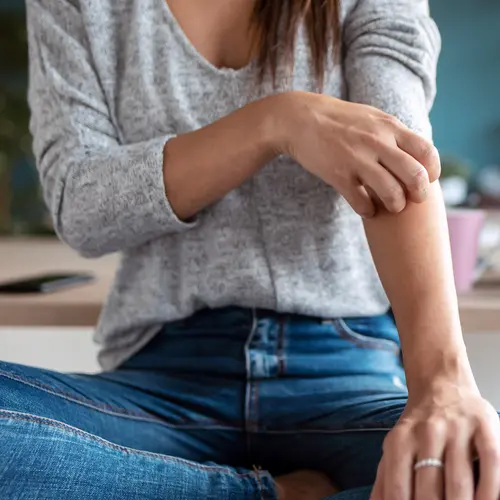Psoriasis probably won't make you look older than anyone else your age. But it can raise your chances of some age-related health problems. And because the condition can cause sores on your scalp and skin, you'll want to be careful with the products and treatments you use to fight the signs of aging.
Take a Whole Health Approach
When you think about psoriasis and your health, you might focus only on your skin. But you need to take a broader look at your health as you age. Psoriasis can make you more likely to get some kinds of cancer, such as lymphoma and non-melanoma skin cancer. It also can raise your risk of low bone density conditions like osteopenia and osteoporosis. And the same is true for type 2 diabetes and metabolic syndrome (a group of medical problems that includes heart disease and high blood pressure).
About 30% of people who have psoriasis also get psoriatic arthritis. That’s a condition that causes stiff and swollen joints and other issues like fatigue. Psoriatic arthritis often gets worse over time, especially if it’s not treated.
“If you have psoriasis, it’s especially important to work closely with all your doctors,” says Shari Lipner, MD, PhD, a dermatologist at Weill Cornell Medicine and New York-Presbyterian Hospital in New York.
If a dermatologist or rheumatologist treats your psoriasis, make sure your primary care physician or family doctor knows what kinds of psoriasis treatments you’re getting and have gotten in the past. Some psoriasis medications may make you more likely to have health problems like infections or cancer. So your doctor may want to keep a closer watch on you. And some medications used to treat arthritis, heart disease, and other conditions may make psoriasis worse.
Eating right and exercising regularly can help you stay healthy as you get older. They also can help with inflammation and keeping your weight in check, which can ease psoriasis symptoms. A healthy lifestyle also lowers your chances of psoriasis-related health problems like heart disease and type 2 diabetes.
Choose a Skin-Soothing Anti-Aging Routine
If you use over-the-counter products to help with wrinkles, sunspots, dryness, or other signs of skin aging, check the label closely. “Skip gel-based products,” says Lipner. “They usually contain alcohol, which can be drying and painful for psoriasis-affected areas.”
Instead, choose products that are alcohol-free and hypoallergenic. Also look for products with ceramides, lipids, and hyaluronic acid. Your body makes less of these natural moisturizers as you age. Adding them back with a lotion or cream can soften your skin and help with psoriasis scaling.
“Salicylic acid helps with flaking and aging,” says Laura K. Ferris, MD, PhD, an associate professor of dermatology at the University of Pittsburgh Medical Center. “So that can also be a good choice for skin affected by psoriasis.”
Retinoids are compounds made from vitamin A and are sometimes called Retin-A. They are thought to be the gold standard for anti-aging. They can help with wrinkles and brown spots, too. It’s okay to use an over-the-counter or prescription retinoid product if you have psoriasis. But ask your dermatologist for guidance, Lipner says. “You should start with a very small amount and build up over time,” she says. “And don’t use retinoids during a flare-up.”
Be Careful With Cosmetic Procedures
When you have psoriasis, injuring your skin -- even on purpose with an anti-aging procedure -- can cause plaques or lesions. “That’s rarely a problem with injectable cosmetic procedures like fillers and Botox,” says Ferris. “But chemical peels, dermabrasion, and some laser resurfacing procedures may contribute to a flare.”
No two people are the same, so work with your dermatologist to figure out a personalized plan for your skin.
Take Special Care With Your Scalp
It’s fine to color your grays. But be careful. Even if you don’t have plaques on your scalp, it’s smart not to shampoo your hair 1 or 2 days before and after dyeing it. This lets your hair’s natural oils protect your scalp and helps prevent irritation that could cause a flare.
“Be sure to use any topical medications your doctor prescribes before and after dyeing so your scalp stays in the best shape it can,” says Lipner.
Ask your stylist to shampoo and style your hair gently. If you’re in the middle of a flare or are especially sensitive, think about going with highlights or lowlights instead. They can be put on with foil, which keeps hair dye from getting on your scalp.

